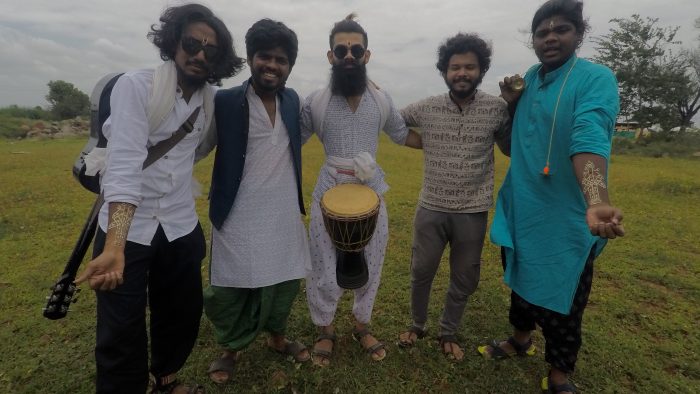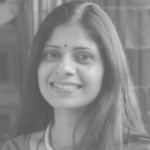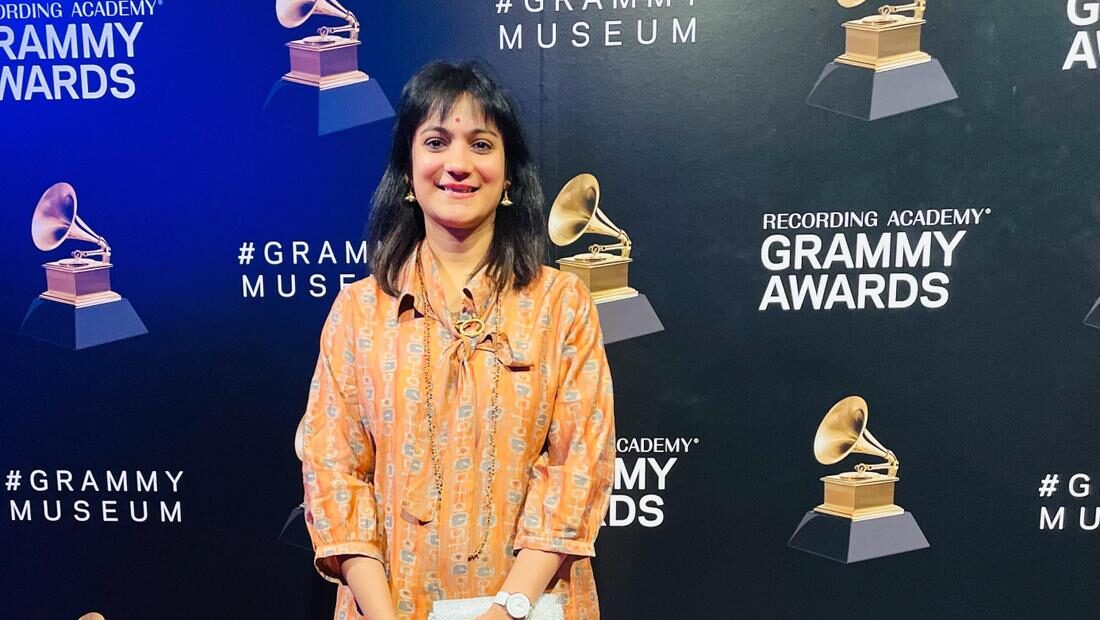In an informal jam recording of the song – Pundalik Varde, the members of the Abhanga Repost band can be seen
sitting in a tiny room in t-shirts and shorts, reciting the names of all the
sants of the Varkari Sampradaya. Not the
lyrics one would expect from geeky youth – the names of the gurus of the bhakti
movement associated with the Varkaris including Jnanesvar, Namdev, Chokhamela,
Eknath, Tukaram and Gadge Maharaj.
Abhanga Repost is a folk fusion band which performs Abhangas written by these
composers who worshipped Vittala (or Vithoba) in Maharashtra. But they have
given these age-old compositions a modern twist.
Guitarist and vocalist Ajay Vavhal, harmonium player Piyush Aacharya,
bass guitarist Swapnil Tarphe, tabla player and multi-percussionist Viraj
Aacharya and drummer Dushyant Deorukhkar have come together to create a buzz
around the Abhanga.
Historically, the Abhanga has
influenced many musical traditions in India. The Sangeetha Ratnakara of
Sarangadeva, one of the most important musical texts of India, was from
Devgiri, which is in present-day Aurangabad. Both Hindustani and Carnatic
traditions consider this to be a definitive text on music.
One expert on Abhangas told this
author that while the first example of a scientifically composed South-Indian krithi
was Jayadeva’s Ashtapadis, it happened at the same time as the Marathi Abhangas
during Sant Gyaneshwar’s period. Marathi Abhangas have the same structure as
krithis -- eight lines and then the writers’ name at the end. Ashtapadis are sung in different
locations in different manners. And the dhruvapada,
which is the most important part in a composition is still sung in a chorus
only in Marathi abhangas today.
He adds that the Varkari Sampradaya
(those who walk by foot every year to Pandharpur on Ashada and Karthika
Ekadashi) laid a lot of stress on community development and music in the
community had to come through the participative element, irrespective of
gender.
The dhruvapada is structured in such a way that the pitch is common to
male or female voices. This unique feature of the Marathi abhanga is not to be
found anywhere else in the world. It uses pakhawaj
(percussion instrument) as an accompaniment which has a lot of base frequency.
It also uses a very different tala structure of high frequency. Anyone
listening is touched as it traverses the entire range of frequency of human
receptivity.

All the members of the Abhanga Repost band have a good sense of Indian
classical music as they have performed with different classical/fusion
bands/artistes. “We have been listing to Indian classical music since our
school days and we also try to incorporate classical music in our compositions
of Abhanga,” says Swapnil.
Tabla player Viraj is undergoing training under Pandit Ramdas Palsule
and his brother and harmonium player Piyush has been trained by Pandit Ajay
Jogalekar. He is also undergoing vocal training from Vidushi Nandini Bedekar.
The band members also try to attend different classical baithaks to experience
the nuances of Indian classical music.
The band was started in 2016 by Swapnil and Dushyant whose families are
from the Varkari Sampradaya and so were familiar with these Abhangas. College
mates, their mutual love for music and a sense of community brought them
together. The lyrics of the Abhangas, deeply allegorical, appealed to the two
youngsters. “Each Abhanga has message for a society. It is so commendable that
whatever these saints wrote hundreds of year ago, is still applicable in the
21st century, be it be a call for revolution by Tularam, Bhakti worship by
Dnyaneshwar or social awareness by Eknath.”
Abhangs are typically very high energy renditions, where the devotees
dance, play the dholak and cymbals and everyone joins in the chorus. “In the
traditional renderings many Indian instruments were used as accompaniments
while presenting the songs. So we too decided to retain its originality by
using the tabla and harmonium (which are a must in an Abhanga rendition.) The
guitar imitates 'iktari' and drums and the bass guitar plays the role of the Pakhwaj
and Dhol and this is how we 'Repost' it!” says Swapnil.
He adds, “Our performance is nothing but a modern 'Kirtan'. We also
dress traditionally while performing to keep that folk feel intact. We don't
wear the clothes which the varkaria wear but yes we make sure our clothes don't
look out of place.”
The band spends a lot of time on research on every Abhanga they render
before tuning it, to maintain integrity with the original as well as to retain
the meaning. They say while they themselves like all Abhangas, 'Lahanpan dega deva' and 'Amhi bi-Ghadalo' by Sant Tukaram are immensely
popular amongst listeners.
Lyrics of 'Lahanpan dega deva'
lahan pan dega deva | mungi sakhrecha rawa ||
airawat
ratan thor |tyasi ankushcha mar||
jaya angi mothepan |taya yatana kathin ||
tuka mahne barve| jan whave lahahuni lahan||
mahapure zade jati| tehte lavhael wachati||
The lyrics refer to Sant Tukaram beseeching the Lord to give him
back his childhood because it is the only time when man is without Ahamkara or
pride.
The band members say for them Bhakti, revolution, art and music are the
same. “One has to practice dedicatedly to achieve these things. We can say
these are different roads leading to one destination that is divinity or inner
piece!”
Their novel approach has brought new audiences to Indian music. “We have
received messages from many people who are non-Maharashtrians telling us they
were touched by the beauty of the Abhangas. We have also been successful in
taking this literature to youngsters who identify with a young band like us.”
The Abhanga has travelled far from its early underpinnings. Sant Namdev
has written poetry in Punjabi and his work feature in the Guru Granth Sahib. It
is also commonly believed that Abhangas influenced Carnatic
music, more specifically the Dakshina Bhajana sampradaya first started by
Maruthanallur Swamigal. This in turn influenced the Trinity when Thanjavur was
under Marathi rule. “So basically the concept is not confined to
Maharashtra. We haven't yet played in the southern part of India but we would
love to perform there and spread the wisdom of these beautiful poems,” says
Swapnil.





